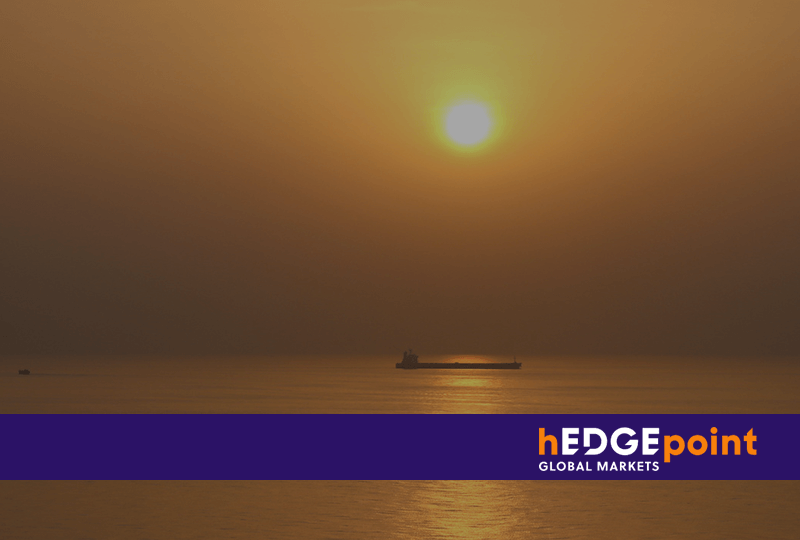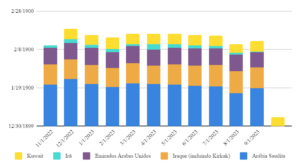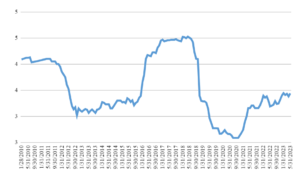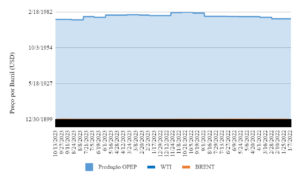
The conflict between Israel and Hamas in the Middle East, which began on October 7, could impact the Strait of Hormuz. This region is crucial for the strat

The conflict between Israel and Hamas in the Middle East, which began on October 7, could impact the Strait of Hormuz. This region is crucial for the strategic transportation of a large chunk of global oil production.
The war has introduced a new element of volatility into international commodity markets and upped the probability of affecting global energy security. Since then, the energy sector has remained on alert due to potential developments.
Keep reading to find out:
The Strait of Hormuz is the channel that connects the Persian Gulf with the Gulf of Oman, and by extension, the Indian Ocean. Located between Iran and Oman, it’s one of the main routes for some of the planet’s largest oil exporters. Thus, it’s an extremely strategic maritime route.
The strait’s importance lies in the fact that it’s a transit point for the shipment of oil and natural gas from the Persian Gulf countries to international markets. It’s estimated that around a fifth of the world’s crude oil production flows continuously through the Strait of Hormuz.
In other words, this percentage is equivalent to around 17 million barrels of oil per day, according to the most recent data from BNN Bloomberg. Hence, any event in this region can be reflected in the prices of gasoline and diesel, causing an impact on the whole planet’s economic situation.
Cumulative monthly shipping of crude oil from the Middle East (millions of barrels)

Source: hEDGEpoint Global Markets
Alternatives to bypass the Strait of Hormuz are limited. Only Saudi Arabia and the United Arab Emirates have pipelines that can move crude oil out of the Persian Gulf. In addition, only these two countries have additional shipping capacity to get around the Strait of Hormuz.
The war between Israel and Hamas has sparked fear in the energy market, worsening risk aversion. Assets such as commodities should feel the effects, especially if Iran gets involved. That country’s entry into the conflict could significantly increase tensions and adversely affect the Hormuz maritime passage.
Iran is one of the major producers and exporters of oil and natural gas in the Middle East. The nation is already subject to Western sanctions that could be increased, making it more difficult for Iranian oil to be traded. The result? Increased energy costs for the entire market.
The combination of the high demand for oil and the limited supply, due to OPEC+ (the Organization of Petroleum Exporting Countries) actions, has created a favorable environment for Iranian oil. The country increased its market presence due to key factors such as the greater demand from China.
In recent years, Iran has managed to circumvent Western sanctions and has significantly stepped up its exports. To achieve this, it’s applied techniques that make it difficult to trace the origin of its oil.
If it enters the war, there could be interruptions in the Iranian supply and the threat of even blocking the Strait of Hormuz. In times of geopolitical tension, this measure is a recurring one used by the Iranian government. If this does happen, supply will be further reduced, accentuating price escalation.
Iran’s oil production

Source: hEDGEpoint Global Markets
Such a block of the Strait of Hormuz, even if temporary, could lead to substantial increases in total energy costs and trigger global inflation. The energy market is already quite restrictive. If the value of oil rises, prices will surely come under pressure.
Surging prices are a challenge for monetary authorities seeking to tame inflation. This happens because oil is a basic input for the transport of goods and services, in agriculture as well as manufacturing. Production costs would rise, with ripple effects also felt by consumers.
Top Oil Futures (USD)

Source: hEDGEpoint Global Markets
In recent weeks, inflation data shows that consumer prices rose 0.4% in September, above the market consensus of 0.3%. This bullish surprise has contributed to a greater dissipation of risk aversion. Moreover, the prospect of an increase in U.S. interest rates, and the consequent strengthening of the dollar, impact investors. This is because emerging countries’ currencies lose strength.
So far, we’re only at the start of this war, and there’s no way to accurately anticipate upcoming developments. However, we’re already experiencing the context of a notable increase in volatility, particularly related to oil prices.
In this case, there’s a good chance that inflation will increase soon as a consequence of energy cost hikes. Hedging plays a fundamental role in risk management in the global energy market chain. To achieve this control involves the use of mechanisms capable of protecting energy market participants from adverse price variations.
hEDGEpoint totally understands this sector and the use of hedging instruments. We’re well aware of the global scenario while analyzing all possible consequences to assist you in making better decisions.
Talk to us today to learn how we can help your business.

Rua Funchal, 418, 18º andar - Vila Olímpia São Paulo, SP, Brasil
Contato
(00) 99999-8888 example@mail.com
Section
Home
O que Fazemos
Mercado
Quem Somos
HUB
Blog
Esta página foi preparada pela Hedgepoint Schweiz AG e suas afiliadas (“Hedgepoint”) exclusivamente para fins informativos e instrutivos, sem o objetivo de estabelecer obrigações ou compromissos com terceiros, nem de promover uma oferta ou solicitação de oferta de venda ou compra de quaisquer valores mobiliários, commodity interests ou produtos de investimento.
A Hedgepoint e suas associadas renunciam expressamente a qualquer uso das informações contidas neste documento que direta ou indiretamente resulte em danos ou prejuízos de qualquer natureza. As informações são obtidas de fontes que acreditamos serem confiáveis, mas não garantimos a atualidade ou precisão dessas informações.
O trading de commodity interests, como futuros, opções e swaps, envolve um risco substancial de perda e pode não ser adequado para todos os investidores. Você deve considerar cuidadosamente se esse tipo de negociação é adequado para você, levando em conta sua situação financeira. O desempenho passado não é necessariamente indicativo de resultados futuros. Os clientes devem confiar em seu próprio julgamento independente e/ou consultores antes de realizar qualquer transação.
A Hedgepoint não fornece consultoria jurídica, tributária ou contábil, sendo de sua responsabilidade buscar essas orientações separadamente.
A Hedgepoint Schweiz AG está organizada, constituída e existente sob as leis da Suíça, é afiliada à ARIF, a Associação Romande des Intermédiaires Financiers, que é uma Organização de Autorregulação autorizada pela FINMA. A Hedgepoint Commodities LLC está organizada, constituída e existente sob as leis dos Estados Unidos, sendo autorizada e regulada pela Commodity Futures Trading Commission (CFTC) e é membro da National Futures Association (NFA), atuando como Introducing Broker e Commodity Trading Advisor. A Hedgepoint Global Markets Limited é regulada pela Dubai Financial Services Authority. O conteúdo é direcionado a Clientes Profissionais e não a Clientes de Varejo. A Hedgepoint Global Markets PTE. Ltd está organizada, constituída e existente sob as leis de Singapura, isenta de obter uma licença de serviços financeiros conforme o Segundo Anexo do Securities and Futures (Licensing and Conduct of Business) Act, pela Monetary Authority of Singapore (MAS). A Hedgepoint Global Markets DTVM Ltda. é autorizada e regulada no Brasil pelo Banco Central do Brasil (BCB) e pela Comissão de Valores Mobiliários (CVM). A Hedgepoint Serviços Ltda. está organizada, constituída e existente sob as leis do Brasil. A Hedgepoint Global Markets S.A. está organizada, constituída e existente sob as leis do Uruguai.
Em caso de dúvidas não resolvidas no primeiro contato com o atendimento ao cliente (client.services@hedgepointglobal.com), entre em contato com o canal de ouvidoria interna (ombudsman@hedgepointglobal.com – global ou ouvidoria@hedgepointglobal.com – apenas Brasil) ou ligue para 0800-8788408 (apenas Brasil).
Integridade, ética e transparência são valores que guiam nossa cultura. Para fortalecer ainda mais nossas práticas, a Hedgepoint possui um canal de denúncias para colaboradores e terceiros via e-mail ethicline@hedgepointglobal.com ou pelo formulário Ethic Line – Hedgepoint Global Markets.
Nota de segurança: Todos os contatos com clientes e parceiros são realizados exclusivamente por meio do nosso domínio @hedgepointglobal.com. Não aceite informações, boletos, extratos ou solicitações de outros domínios e preste atenção especial a variações em letras ou grafias, pois podem indicar uma situação fraudulenta.
“Hedgepoint” e o logotipo “Hedgepoint” são marcas de uso exclusivo da Hedgepoint e/ou de suas afiliadas. O uso ou reprodução é proibido, a menos que expressamente autorizado pela HedgePoint.
Além disso, o uso de outras marcas neste documento foi autorizado apenas para fins de identificação. Isso, portanto, não implica quaisquer direitos da HedgePoint sobre essas marcas ou implica endosso, associação ou aprovação pelos proprietários dessas marcas com a Hedgepoint ou suas afiliadas.
aA Hedgepoint Global Markets é correspondente cambial do Ebury Banco de Câmbio, de acordo com a resolução CMN Nº 4.935, DE 29 DE JULHO DE 2021, Artigo 14 do Banco Central do Brasil (BACEN).
Para mais informações sobre nosso parceiro, serviços disponíveis, atendimento e ouvidoria, acesse o link a seguir: https://br.ebury.com/